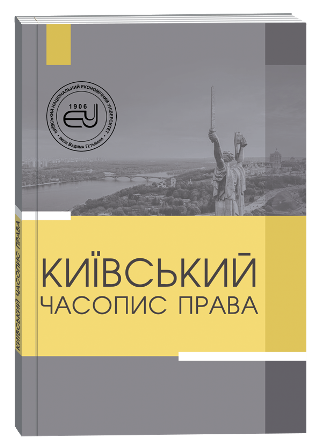FORMATION AND DEVELOPMENT OF ADMINISTRATIVE AND LEGAL RESTRICTIONS IN THE LEGISLATION OF FOREIGN COUNTRIES
DOI:
https://doi.org/10.32782/klj/2021.3.26Keywords:
restrictions, administrative law, public authorities, administrative and legal regulation, mechanism.Abstract
The scientific article examines the formation and development of administrative and legal restrictionsin the legislation of foreign countries.It is noted that the evolution of administrative and legal restrictions in the legislation of foreign countries ischaracterized by the following features: 1) the determining grounds for the establishment of administrative and legalrestrictions were geopolitical, socio-economic, psychological factors; 2) there is a clear tendency to strengthenthe rules of international law on the principles and types of administrative and legal restrictions established bylaw; 3) characteristic anti-individualist ideology of application of administrative and legal restrictions; 4) therewas a reformatting of administrative and legal restrictions into self-restraint in order to achieve the public good;5) administrative and legal restrictions are applied in every sphere of public life without exception on the basisof the relevant normative legal act.Since the twentieth century under the influence of the development of constitutionalism and parliamentarism,the protection of individual rights and freedoms was given special importance. Administrative and legal restrictions have received their normative definition not only in separate legislative acts within one country. The internationalcommunity has adopted relevant acts, which enshrine the principles of possible application of restrictions only inthe public interest. During this period, restrictions were natural in nature, i.e. certain types and grounds for theirapplication were clearly regulated by law and ensured by establishing a legitimate social order. By empoweringthe authorities to protect human rights and freedoms through the possibility of applying certain restrictions, the statecreates a vulnerability of these rights. Therefore, we should talk not only about their protection, but also aboutthe obligation to limit the powers of authorized bodies in order to prevent the narrowing of the scope and contentof the rights and freedoms of the subject.Excessive restrictions had to be assessed by the courts, as administrative judges used a general techniqueof administrative control. At the same time, the intensity of judicial control depended on the nature of the contestedmeasures; if the dispute concerned human rights, the judges exercised special control. However, as practice shows,proper control of the proportionality of restrictions by administrative courts was situational rather than systematic.
References
Гаагская Конвенция о мирном решении международных столкновений 1907 г. URL: http://ppt.ru/newstext.phtml?id=32048.
Лист Ф. Международное право в систематическом изложении ; пер. с 6-го нем. изд. / под ред., с пред-исл. и доп. В.Э. Грабарь. 4-е рус. изд. ; испр. и доп. Юрьев : Тип. К. Маттисена, 1917.
Михман Д. Катастрофа европейского еврейства. Тель-Авив : Открытый университет Израиля,2001. Т. 2.
Конституции буржуазных стран. Москва ; Ленинград : Соцэкгиз, 1936. Т. 1.
Эволюция российского и зарубежного государства и права. К 80-летию кафедры истории государстваи права Уральского государственного юридического университета (1936–2016). Т. II : Сборник научных тру-дов. URL. http://profil.ranepa.ru/docs/pubs/p2628/583b25cf78e74.pdf.
Reichsgesetzblatt 1939. Teil I. S. 1540.
Essner C., Conte E. Op. cit. S. 214.
Госслужба зарубежных стран. URL. http://ecsocman.hse.ru/data/2012/01/24/1269082913/Глава%206.pdf.
Статус беженца в Бельгии, основные сведения. URL. http://www.nordiclife.org/kratkaja-spravka-po-stranam/belgiya.html.







